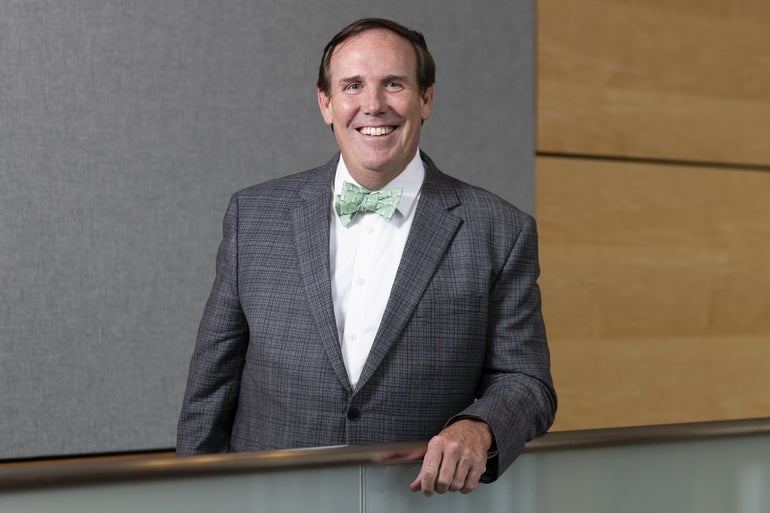When students return to campus at Nichols College this fall, they will be greeted by a new face: Glenn Sulmasy, who began his term July 1 as president of the institution in Dudley.
Get Instant Access to This Article
Subscribe to Worcester Business Journal and get immediate access to all of our subscriber-only content and much more.
- Critical Central Massachusetts business news updated daily.
- Immediate access to all subscriber-only content on our website.
- Bi-weekly print or digital editions of our award-winning publication.
- Special bonus issues like the WBJ Book of Lists.
- Exclusive ticket prize draws for our in-person events.
Click here to purchase a paywall bypass link for this article.
When students return to campus at Nichols College this fall, they will be greeted by a new face: Glenn Sulmasy, who began his term July 1 as president of the institution in Dudley.
Sulmasy, who previously served as the provost and chief academic officer at Bryant University in Rhode Island, was chosen by a search committee in March to be the eighth president of Nichols College. As he steps into his new role, Sulmasy plans to address the challenges of the turbulent field of higher education by increasing outreach and expanding the Nichols brand beyond Central Massachusetts, including internationally.
“It’s critically important to put the word out about Nichols,” said Sulmasy. “Internally we know our worth, but being a secret success is no longer practicable in this state of higher education. The key is that words matter, and I want to clearly communicate as president that this is the business school of choice.”
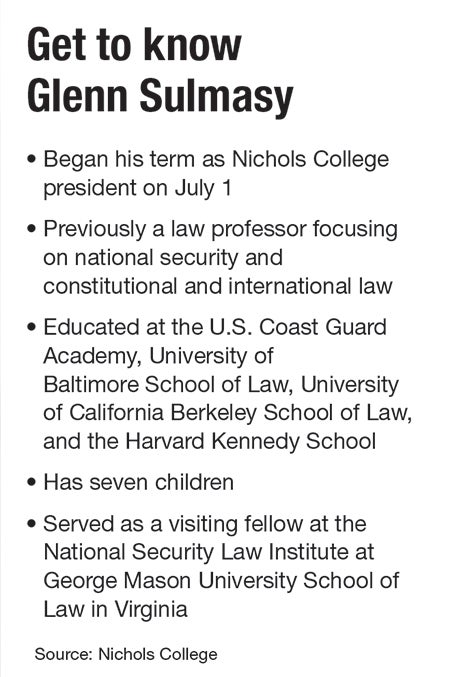
One component of growing Nichols’ name recognition is the college’s plan to seek accreditation from the Association to Advance Collegiate Schools of Business by the 2022-2023 academic year, a process involving documenting a commitment to business education and hiring employees with terminal educational qualifications.
Additionally, Sulmasy said marketing alumni outcomes in job placement and graduate school offers as critical to the ability to prevent the statewide trend of declining student enrollment from occurring at Nichols, where enrollment fell 7.8% from the 2018 to 2019 fall semester but rose 17% from 2019 to 2020.
“One component of the return on investment on a Nichols degree is experiential learning. Employers want to have an opportunity to have people come who are prepared to work,” said Sulmasy. “My job in the next six months is to find the needs of the business community in Worcester. We want to build a relationship by having our students go work for them in an internship.”
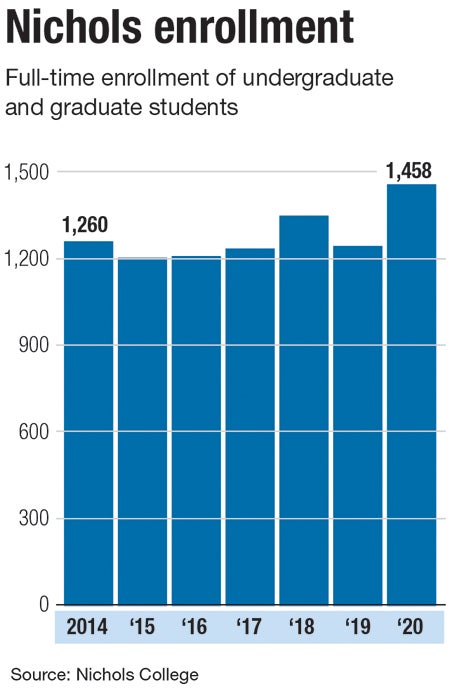
Fighting an enrollment decline
While the COVID-19 pandemic sharply dropped the rate of first-year entrants to college in 2020, the plummet follows years of declining enrollment. According to the Massachusetts Department of Higher Education, public higher education enrollment has decreased by roughly 2% each year since 2015. After 2025, first-year enrollment rates are expected to fall even further as the significantly smaller age cohort born after the Great Recession applies for university.
“The pandemic has accelerated the challenges that were already coming. We had demographic challenges that institutions of higher education were already facing prior to the pandemic that have accelerated,” said Francesco Cesareo, president of Assumption University. “It has forced institutions to prepare more proactively for the challenges we will see further down the road.”
Sulmasy emphasized equipping students with new training as a component of meeting the evolving needs of the workplace and competition among college graduates to secure employment.
“The [certified public accountant] exam will require analytics by 2024, and accounting firms aren’t going to hire anyone who doesn’t have that background,” said Sulmasy. “All students are going to need to have some exposure to data science regardless of what field they are going into. The goal is for us to be realistic. We want to provide every student a toolkit to survive the marketplace.”
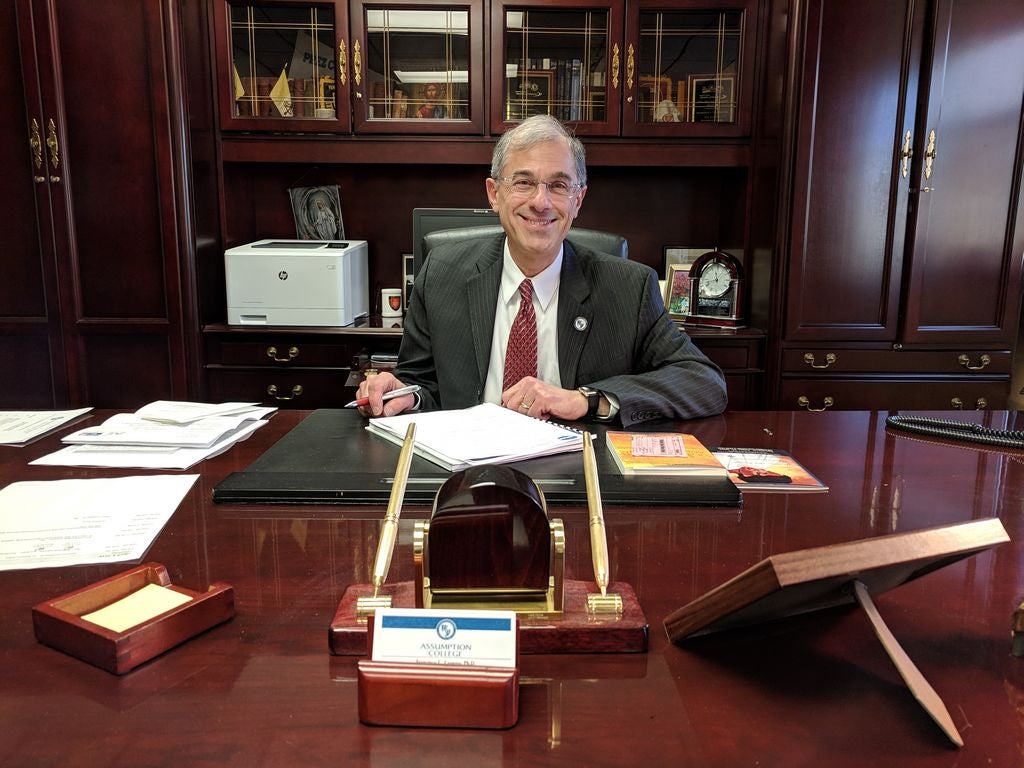
Attracting global students
For Nichols, the preparation includes plans to expand partnerships internationally. The development provides the double benefit of increasing both outreach to new student populations and opportunities for the existing ones.
“We’re working on a relationship with a college in Colombia as well as one in China. It’s important for the Nichols brand to get in with our competitors by expanding internationally,” said Sulmasy. “I’m committed to growing Nichols’ international business program partially by providing internships internationally.”
The push to extend outreach reflects the need for universities to articulate a brand to donors. Assumption University, which changed its name from Assumption College in 2019, did so in part to reflect administrative reorganization.
“The branding of an institution is very critical. It represents the promise that you can give to prospective students and their families in terms of their outcomes,” said Cesareo. “Following the name change, we’ve already seen that philanthropic support has increased. Additionally, we saw an increase in applications prior to the pandemic that we hope to see resume post-pandemic.”
Sulmasy said he and leaders of other local colleges face a difficult task.
“It’s going to be a bumpy road. In New England, the reality is that the demographics are not in our favor,” he said. “We have to compete for the same limited pool of students.”
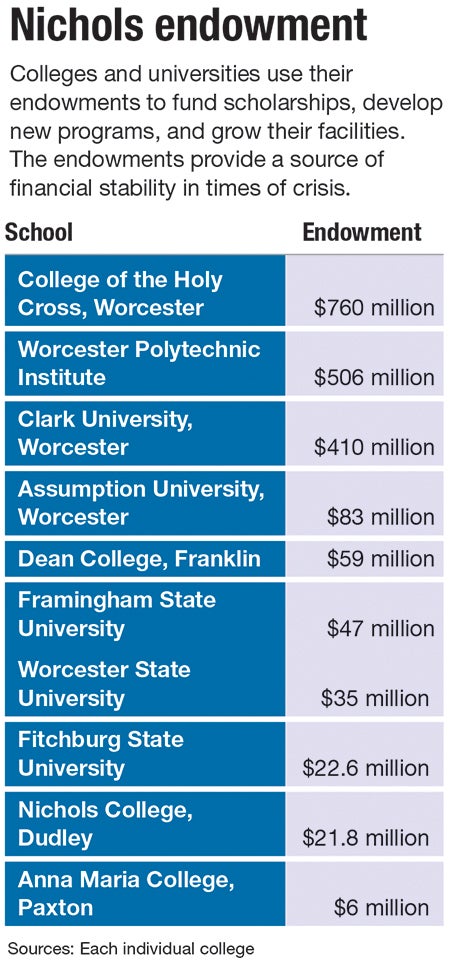
Talking money
Sulmasy expressed his interest in continuing to develop the relationships within Central Mass. begun by his predecessor, Susan West Engelkemeyer, as well as building on her fundraising success. Under her tenure, Nichols’ bicentennial fundraising campaign surpassed its goal of $45 million to eventually raise $66 million by its conclusion.
Nichols endowment is $22 million, which is the second lowest among the 10 four-year Central Mass. universities.
“Growing the endowment is an important part of what we need to do. I see this as one of my primary jobs. It’s critical to be able to provide scholarships and opportunities for underprivileged students and to endow professors and programs,” said Sulmasy.
Looking ahead to the next decade, Sulmasy’s goals reflect not only his ambition for Nichols but his anticipation of the challenges to come.
“We have to talk about return on investment in admissions outreach,” said Sulmasy. “Higher education costs too much these days to have just to have as a benefit. It’s critical for job placement. If college administrations aren’t focused in that mindset, they’re not going to survive the next 10 years.”
